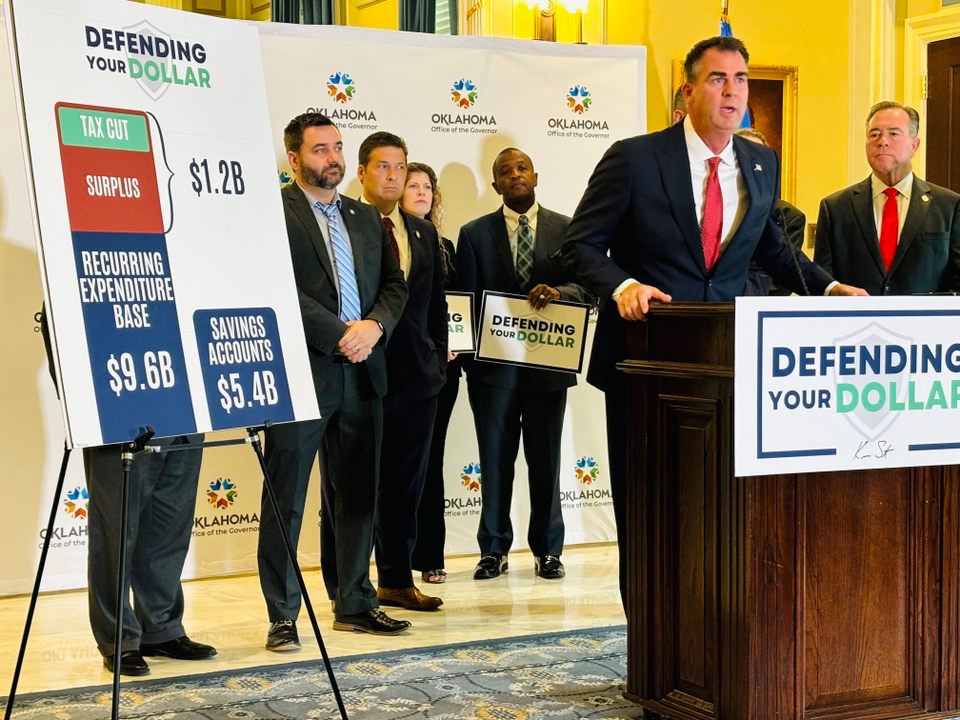Emma Cash Feature- How One OU Senior is Taking an Untraditional Path
Washington DC Work

Voices of Resilience (A Gaylord News Reporting Project)

Agriculture and energy were key topics during Iowa caucus season

Cody Smith, a policy analyst with the Iowa Environmental Council, said he thinks that renewable energy sources such as solar and wind will continue to grow in Iowa. Ireland Fitzer/Gaylord News
By: Maddy Cantrell
Gaylord News
January 15, 2024
DES MOINES, Iowa – In a state where cornfields dominate the landscape and wind turbines pop up like crops, farming and energy are issues that rise to the forefront during caucus season.
Cody Smith, a policy analyst with the Iowa Environmental Council, said energy is one of the fastest-growing industries in Iowa, as renewable sources such as ethanol, wind and solar are key for farmers.
For many, leasing acres of land to energy companies provides a mutually beneficial deal and increases the profitability of operations. Even for farmers with land outside of windflow areas, the ability to lease land to power companies for grid expansion offers alternative income opportunities for when crop prices are low.
Erin Cumings, a fourth-generation Iowa farmer with a 500-acre operation, says that for farmers like her, labor is the biggest issue.
“It’s intensive to put in a crop, to take out a crop and to take care of livestock,” Cummings said.
Another issue farmers nationwide face is access to and regulations surrounding water. Iowa farmers do not deal with the same limitations on irrigation that farmers in California face, Cummings said, but they do face challenges with water filtration of runoff from crops and from livestock.
“We’re not super close to a major water source, but it’s still something I worry about,” she said.
Iowa water contributes, according to Smith, to downstream environmental impacts such as a nutrient buildup in the Gulf of Mexico. That has spurred another big conversation in environmental policy: soil health.
“There’s been a renewed focus on soil health in the state of Iowa,” Smith said.”That focus on soil health has been an emerging focus throughout the Midwest in particular and is also seen as a climate solution by a lot of farmers.”
Whoever is elected president will have control over the Environmental Protection Agency and can change agency policy. The EPA and FDA (Food and Drug Administration) handle most regulations that affect farmers at the federal level.
“It’s less about how do we prop up agriculture, instead it’s about how do we ensure regulation doesn’t dampen what we do,” Cumings said.
Organizations such as the Biofuel Conference and the Farm Bureau are key organizers of farmers as a voting block, something candidates such as Ron Desantis have used in their campaigns. Desantis and Iowa Gov. Kim Reynalds made appearances at the annual Iowa Renewable Fuels Summit to address the ethanol industry directly, as Desantis has been back- and-forth on his policy proposals.
At the same conference, Haley attacked Desantis, saying, “Did he tell you that he authored legislation to ban the Renewable Fuel Standard? Did he tell you that he co-sponsored five different bills to ban the Renewable Fuel Standard?”
For some Iowa farmers, corn is their primary crop. Ethanol is an essential product that comes from Iowa corn. Cumings said that it is hard to generalize, but Iowa farmers tend to be pro-renewable fuels such as ethanol or biodiesel (a product of soybeans) because of how important it is to their farms.
Iowa has large swaths of land that do not belong to residents of the state, and Smith said that has caused some anxiety about foreign ownership.
“That’s a common thing about Iowa agriculture. When so many farms are just corn and soybeans… that alone can be thousands of acres,” Cumings said.
Cumings said that if the 2023 Farm Bill as currently written gets passed, its support for smaller and beginning farmers will help greatly. He said that keeping exports high will also help farmers, as it enhances crop prices.
As for the caucuses on Monday, Cumings said she would not be participating.
“I’m kind of skeptical. We’re so early in the process and I think it’s all talk. We don’t know what all is going to happen.”
Gaylord News is a reporting project of the University of Oklahoma Gaylord College of Journalism and Mass Communication. For more stories by Gaylord News go to GaylordNews.net.
If it fails, it fails,” Stitt says in advance of Senate adjournment
By: Maddy Cantrell, Katrina Crumbacher, Kevin Eagleson and Olivia Talkington
Gaylord News
After convening for less than six hours, a second special session of the Oklahoma Legislature called to cut taxes adjourned sine die without seeing so much as a bill.
Although calling the session, Gov. Kevin Stitt did not appear for the much anticipated Senate Appropriations Committee hearing, or on the floor of the Senate at all, even though he had been asked to appear by senate leadership.
Stitt foreshadowed the possibility that little would happen during a press conference before the legislature convened.
“If it fails, it fails,” he said.
General aversion by many senators to the plan as a whole contributed to the lines of questioning by members of the body. Senate Floor Leader George McCourtney (R, Ada) alluded to this fact during his questioning of Treasurer Todd Russ at the committee hearing.
“I appreciate you attending the press conference and then being able to press the fifth floor button on the elevator and be here,” Senate Floor Leader Greg McCortney (R, Ada) told State treasurer Todd Russ.
House leaders were adamant that this session would be successful, and a proposal for tax cuts was necessary to make this session worthwhile.
House Floor Leader Jon Echols said, “If we were to do anything this session, that means the citizens of the state of Oklahoma would have tax relief this year… if we choose to wait, that is one more year where we are holding on to the citizen’s money.”
Echols and the house adjourned until 9:30 am Wednesday, Oct. 4 while the senate convened after the Appropriations hearing finished.
Senate President Pro Tempore Greg Treat laid the blame squarely at Stitt’s feat.
“I had not planned on doing the following motion, but with the Governor not answering the call and showing up in the special session appropriations and budget committee for a session he called, I move to.. Adjourn sine die,” he said.
“We wanted to give the governor the benefit of the doubt that he would actually show up and defend his plan, very disappointed that he chose not to. It’s not like he was out of the country, it’s not like he was out of the state. He was downstairs,” Treat said.
In preparation for this special session, Stitt proposed a “road to zero” that would mimic other states with a plan to start by making income tax a flat rate regardless of income, and would move to a 0% income tax over a period of time. While these tax cuts are being heavily discussed, Stitt said that the highest priority is budget transparency.
Treat further implied the failure of this session lies with Stitt by stating that if Stitt was not willing to discuss this proposal in an open meeting, then he should not be calling for budget transparency.
Although testimony by Russ at the Appropriations hearing implied that the state would be in good financial health if Stitt’s proposed tax cuts were adopted, questions from members of the Senate showed concern for the ability of the state to adopt any new taxes should there be a need.
Sparking Senate concern was the implications of state question 640. Under this 1992 amendment to the state constitution, lawmakers must achieve a 3/4ths majority on any proposed tax increase or it must pass as a state question, a high threshold for a proposal to reach.
This is cause for concern for many senior legislators, who experienced in 2017 the “dark times” of the state reaching a deficit in spending as a result of low revenue.
“Believe me, I have gone through some of the toughest times in the state with you all. I’ve chewed nails and bit lips and believe me we will go through some tough times,” Russ said.
Russ, having previously served in the House of Representatives, had his voting record on tax increases and cuts mentioned. Multiple senators, including McCourtney alluded to Russ having voted for tax increases after approving tax cuts when the state was in financial trouble. Russ voted in favor of HB1010xx in 2018, the only tax increase bill to pass since state question 640 was adopted.
Gaylord News is a reporting project is the University of Oklahoma Gaylord College of Journalism and Mass Communication. For more stories by Gaylord News go to GaylordNews.net.

Governor Kevin Stitt delivers his “defending your dollar” plan at a press conference at 9:30 am Tuesday, October 3rd. Less than six hours later, the senate would adjourn sine die without so much as considering a tax cut bill. “If it fails, it fails,” Stitt said. Katrina Crumbacher Photo/Gaylord News